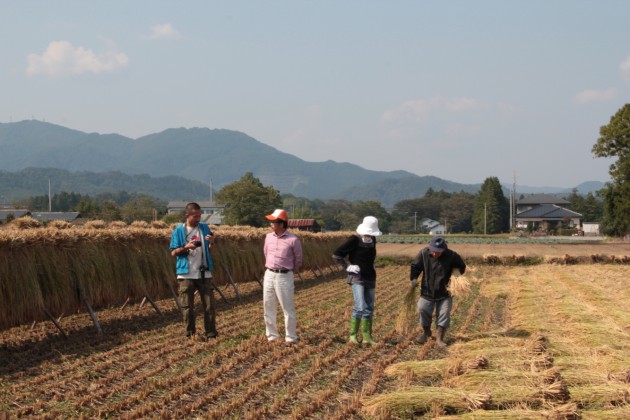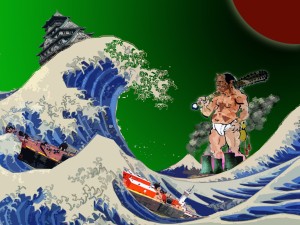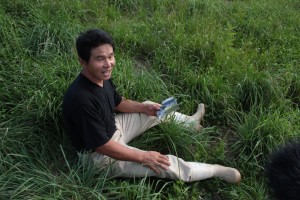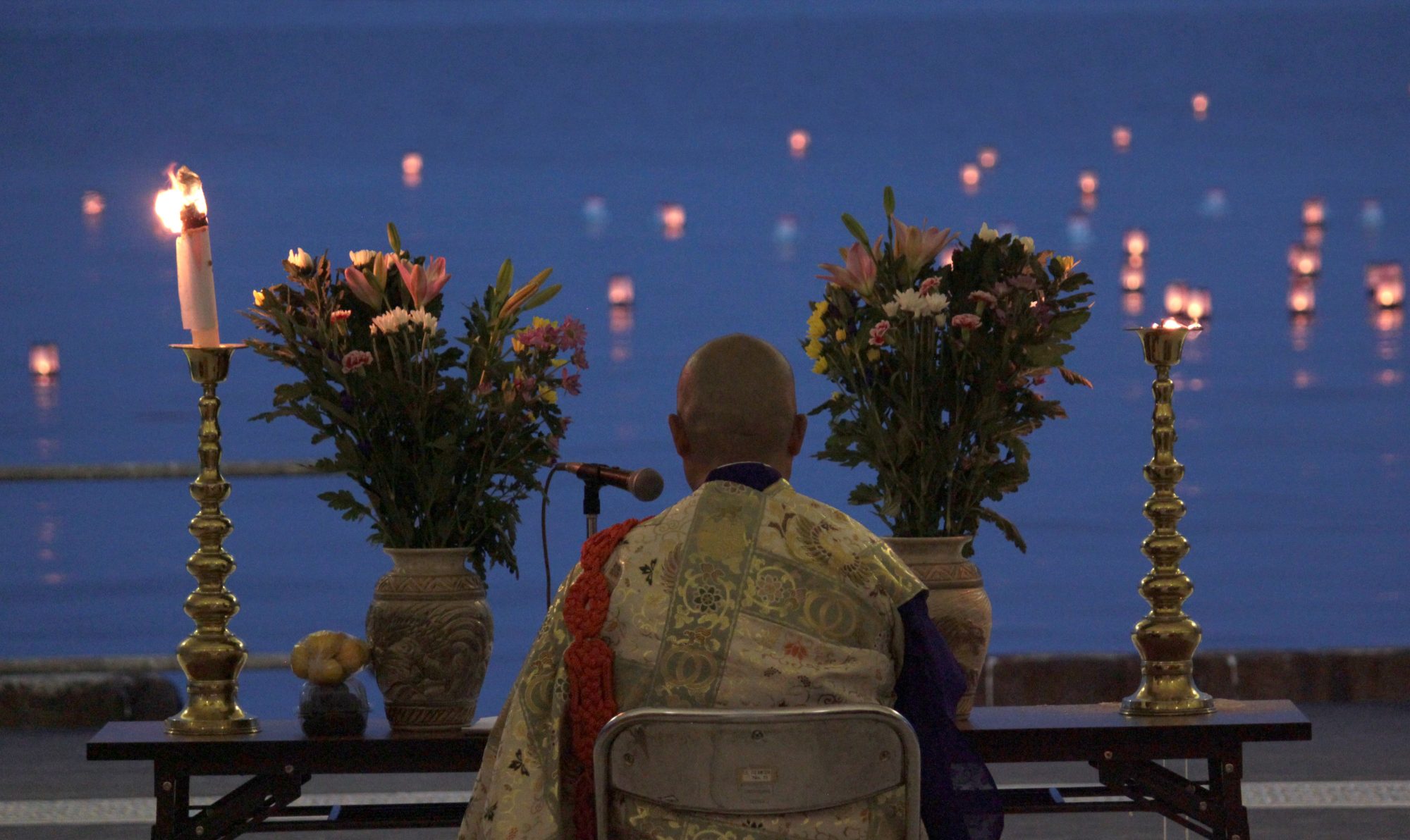Please join our IndieGoGo campaign to help Uncanny Terrain return to Fukushima.
To the East Coast and On to Fukushima
Today Uncanny Terrain codirector Junko Kajino begins an East Coast mini-tour, presenting scenes from the in-progress documentary for schools and community groups. Please join her if you’re in the area.
- Fri 3/2 – 7PM – Georgian Court University, Little Theatre, 900 Lakewood Ave, Lakewood Township, NJ
- Sat 3/3 – 6PM – Ocean County Building, Skywalk Cafe, 2nd Floor, 129 Hooper Ave, Toms River, NJ
- Sun 3/4 – 4PM – Hartsbrook School, Piening Hall, Upstairs auditorium, 193 Bay Rd, Hadley, MA Note corrected time
- Mon 3/5 – 6:30PM – First Church in Salem, Unitarian, 316 Essex St, Salem, MA
- Tue 3/6 – 6PM – Cambridge Friends Meeting Center, 5 Longfellow Park, Cambridge, MA
 Filmmakers Junko Kajino and Ed M. Koziarski spent five months inside Japan’s nuclear contamination zone for our documentary Uncanny Terrain – living and working with the farmers, researchers and volunteers who have committed themselves to take the nuclear crisis as an opportunity to build a better society. We’re going beyond disaster reporting, to show what it is really like for these people who refuse to bow to devastating odds.
Filmmakers Junko Kajino and Ed M. Koziarski spent five months inside Japan’s nuclear contamination zone for our documentary Uncanny Terrain – living and working with the farmers, researchers and volunteers who have committed themselves to take the nuclear crisis as an opportunity to build a better society. We’re going beyond disaster reporting, to show what it is really like for these people who refuse to bow to devastating odds.Now we need your help to return to Japan and revisit those working on the front lines of the nuclear crisis, as they mark the one-year anniversary and the farmers prepare to plant again.
 We need to raise $10,000 by March 31 to cover the cost of traveling to Japan and shooting there through the April planting. Please join us by donating to and sharing our new IndieGoGo campaign. We encourage PayPal contributions because they are tax-deductible, and funds are available to us immediately. Thank you to everyone who has already supported Uncanny Terrain. Please send this invitation to your friends. Join the campaign on Facebook.
We need to raise $10,000 by March 31 to cover the cost of traveling to Japan and shooting there through the April planting. Please join us by donating to and sharing our new IndieGoGo campaign. We encourage PayPal contributions because they are tax-deductible, and funds are available to us immediately. Thank you to everyone who has already supported Uncanny Terrain. Please send this invitation to your friends. Join the campaign on Facebook.
 The organic farmers of Fukushima prefecture toiled for 40 years to grow safe, nutritious and delicious crops on their ancestral land while two nuclear power plants in the prefecture helped feed Tokyo’s increasingly voracious energy appetite.
The organic farmers of Fukushima prefecture toiled for 40 years to grow safe, nutritious and delicious crops on their ancestral land while two nuclear power plants in the prefecture helped feed Tokyo’s increasingly voracious energy appetite.
Since the March 2011 tsunami triggered the meltdown that spread radioactive contamination on much of the lush farmland of Fukushima and eastern Japan, the farmers have been caught between a government in constant denial of the risks of radiation, and outraged citizens who brand the farmers “child murderers” for continuing to cultivate irradiated land.
 But the farmers, researchers and volunteers are committed to building a comprehensive monitoring and reporting network to inform citizens about contamination levels in food, air, water and land, so families can make their own informed decisions; and advancing experimental methods to decontaminate soil or prevent crops grown on contaminated soil from absorbing radiation.
But the farmers, researchers and volunteers are committed to building a comprehensive monitoring and reporting network to inform citizens about contamination levels in food, air, water and land, so families can make their own informed decisions; and advancing experimental methods to decontaminate soil or prevent crops grown on contaminated soil from absorbing radiation.
Fukushima has demonstrated the need for greater public vigilance to keep all our food and energy producers honest, not just about radiation but about all the potential contaminants that our collective appetites introduce into our bodies and our communities.
Please support Uncanny Terrain and help generate dialogue about these vital issues and assure that the struggles of people in Fukushima can stimulate positive change in the world. Thank you!
Uncanny Terrain reception Sunday and more
This is video we shot of the December performance at the Museum of Contemporary Art Chicago by Uncanny Terrain composer Tatsu Aoki‘s group Tsukasa Taiko Legacy at JASC.
Tatsu and his band The MIYUMI Project will accompany preview scenes from Uncanny Terrain with their fusion of jazz and Japanese classical music from 6-7 p.m. at High Concept Laboratories‘ benefit reception this Sunday, Feb. 5, 5-8 p.m. at 1401 W. Wabansia in Chicago.
 Featuring art by David Tanimura, sushi by Chef Atsushi Iwamoto of Mizu Yakitori (thanks to Mayumi Miyazaki and Asako Hoichi), organic Daishichi Sake courtesy of JFC International, kurimanju and inarizushi by Jo Anne Yamamoto of Auntie Jo’s Yummies, and appetizers courtesy of Shino Tamura from Murasaki Saki Lounge.
Featuring art by David Tanimura, sushi by Chef Atsushi Iwamoto of Mizu Yakitori (thanks to Mayumi Miyazaki and Asako Hoichi), organic Daishichi Sake courtesy of JFC International, kurimanju and inarizushi by Jo Anne Yamamoto of Auntie Jo’s Yummies, and appetizers courtesy of Shino Tamura from Murasaki Saki Lounge.
All this for no cover charge! But a portion of art sales and all donations benefit our return to Japan in March to capture the first anniversary of the earthquake, tsunami and meltdown. If you’re coming, be sure to rsvp here or here.
Can’t miss the first half of the Superbowl? Not in Chicago? We still invite you to make a tax-deductible donation to fund the completion of the film.
Make checks payable to our new fiscal sponsor, Asian Improv aRts Midwest (AIRMW), c/o Japanese American Service Committee, 4427 N. Clark, Chicago, IL 60640 (memo: Uncanny Terrain).
And we continue to accept online donations through our ongoing fiscal sponsor Ionia Inc.
 Uncanny Terrain has been awarded a grant from the Illinois Arts Council‘s Individual Artist Support fund for media arts. Thanks!
Uncanny Terrain has been awarded a grant from the Illinois Arts Council‘s Individual Artist Support fund for media arts. Thanks!
Eating Fukushima

by Ed M. Koziarski
North Avenue Magazine
Jan. 28, 2012
When does a victim become a perpetrator? That’s the question that kept coming up as we made our way across the irradiated landscape.
Many foreigners fled Japan after the tsunami triggered a meltdown at the Fukushima Daiichi Nuclear Power Plant last March. My wife Junko Kajino and I went the opposite way, spending five months inside the U.S.-declared 50-mile no-go radius for our in-progress documentary Uncanny Terrain.
Why we’re making Uncanny Terrain
Filmmakers Junko Kajino and Ed M. Koziarski talk about making the documentary Uncanny Terrain, about organic farmers facing Japan’s nuclear crisis. http://tinyurl.com/uncannyterrain
Fukushima 1 Year After the Meltdown
Fukushima farmers’ rice harvest sits in stockpiles, mostly unsold after radioactive cesium was detected in samples in and outside of the prefecture.
Unable to sell their rice, Fukushima organic farmers have become educators, promoting understanding among their customers about the interconnections of land use, energy consumption, and traditional culture.
Despite staggering odds, most of the farmers remain committed to preserving and recovering their land for future generations.
We return to Fukushima this March to capture the recovery efforts a year after the 3/11 tsunami, earthquake and nuclear disaster.
 To support this endeavor, nonprofit arts support organization High Concept Laboratories presents Fukushima: 1 Year After the Meltdown, a benefit reception for Uncanny Terrain, Sunday, Feb. 5, 5-8 p.m. at 1401 W. Wabansia in Chicago.
To support this endeavor, nonprofit arts support organization High Concept Laboratories presents Fukushima: 1 Year After the Meltdown, a benefit reception for Uncanny Terrain, Sunday, Feb. 5, 5-8 p.m. at 1401 W. Wabansia in Chicago.
 From 6-7 p.m. we’ll screen a preview video with live accompaniment by our composer Tatsu Aoki and his band The MIYUMI Project, which performs a fusion of jazz and Japanese classical music.
From 6-7 p.m. we’ll screen a preview video with live accompaniment by our composer Tatsu Aoki and his band The MIYUMI Project, which performs a fusion of jazz and Japanese classical music.
Tatsu is a jazz bassist and a leader of the Chicago Asian American Jazz Festival and Tsukasa Taiko Legacy.
 David Tanimura will showcase his digital collages inspired by the nuclear crisis. Refreshments will be served. The reception is free but rsvp is required, and tax-deductible donations to the film are welcome.
David Tanimura will showcase his digital collages inspired by the nuclear crisis. Refreshments will be served. The reception is free but rsvp is required, and tax-deductible donations to the film are welcome.
Not in Chicago? Can’t make it? Want to help today? We continue to gratefully accept online tax-deductible donations in support of Uncanny Terrain.
Sugeno fights for his Fukushima farm
Seiju Sugeno is an organic farmer in Towa, Nihonmatsu, 50 km from the failed Fukushima Daiichi Nuclear Power Plant. The Abukuma Mountains partly shielded his rice fields from contamination, but runoff is an ongoing threat. Chairman of the Fukushima Organic Farmers Network, Sugeno works aggressively to clean his land and prevent his crops from absorbing radioactive cesium. He will work to reduce the contamination year by year, rigorously testing his yield and reporting any contamination he finds. His 23-year-old daughter Mizuho works with him. He hopes she can build a sustainable life for herself here.
 Uncanny Terrain is a documentary about organic farmers facing Japan’s nuclear crisis, and an online community fostering dialogue on food safety, sustainable agriculture, alternative energy and disaster response. Please keep the conversation going by making a tax-deductible donation.
Uncanny Terrain is a documentary about organic farmers facing Japan’s nuclear crisis, and an online community fostering dialogue on food safety, sustainable agriculture, alternative energy and disaster response. Please keep the conversation going by making a tax-deductible donation.
Fukushima City Nuclear Protest Video
People from across Japan gather in Fukushima City on 6/26/11 to protest the ongoing danger of nuclear power and to call for accountability in the nuclear disaster.
Ruiko Mutou of the Fukushima Network Against Nuclear Power has been opposing the plants since the Chernobyl disaster.
Sachiko Soto of the Fukushima Network to Protect Children From Radiation says that families need support to evacuate children, who are most at risk from radiation.
A representative of the Tokyo Association to Protect the Victims of TEPCO says that Tokyo must take responsibility for the nuclear crisis.
One woman calls on the skeptical crowd to trust their fate to God.
And a 25-year old farmer in western Fukushima chooses to stay and do what she can to help rather than return home to Nagano.
Uncanny Terrain is a documentary about organic farmers facing Japan’s nuclear crisis, and an online community fostering dialogue on food safety, sustainable agriculture, alternative energy and disaster response. Please keep the conversation going by making a donation.
New intern on Colors of the Four Seasons Farm
Can’t sell rice, but has to grow it anyway
Takahashi was banned from selling rice grown on his land in Nishigo Village, Nishishirakawa-gun, Fukushima, due to soil contamination from the nuclear disaster. But he was also told that to receive compensation for the lost income, he must grow the rice. So he’s planting the crop, expecting it will never be eaten.








